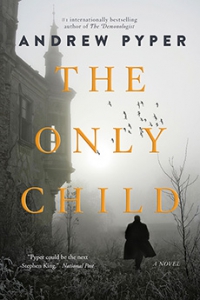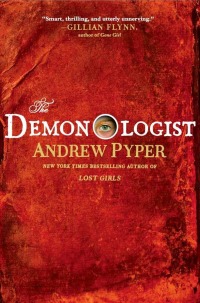The Only Child by Andrew Pyper
 Monday, May 22, 2017 at 9:13AM
Monday, May 22, 2017 at 9:13AM 
Published by Simon & Schuster on May 23, 2017
The Only Child is a horror novel, but it’s not the horror novel I expected. Is it a vampire novel? Not really, because the vampire genre has devolved into a branch of romance fiction thanks to Twilight and its trashy imposters. There’s only a bit of romantic blood lust in The Only Child, although the protagonist, a fellow named Michael, once wooed Mary Shelley.
Michael is a monster, a blend of Dracula and Frankenstein and Mr. Hyde, who has a taste for blood and nineteenth century horror writers. Give Andrew Pyper credit for drawing on the classics for inspiration.
Michael says he was created to be the prototype of a perfect soldier. Those plans never turn out quite as the mad scientist expects. But whether Michael is telling the truth about his origins is not entirely clear.
What is clear, perhaps, is that Lily Dominick is his daughter. And that Lily’s mother was torn apart by a bear when Lily was six. Except it might not have been a bear. And while Lily’s memories of that day might not be entirely reliable (did she really ride away from the crime scene on a white horse?), it doesn’t take much to convince her that she is a monster’s daughter.
Lily is now a forensic psychiatrist who assesses the mental health of individuals who, more often than not, have committed horrible crimes. The story begins with a man who tore the ears off a stranger so that he would be evaluated by Lily. At least, that’s what he tells her. The man is Michael, who claims to be over two hundred years old.
Michael manipulates Lily in ways that lead her to Eastern Europe and a variety of threatening encounters. Lily wants to learn the truth about the man, about her mother, and perhaps about herself, but separating truth from deception is difficult. The eventual question for Lily is whether she should make an alliance with Michael or with the people who are trying to kill him. It’s a tough question.
Pyper is an excellent storyteller and The Only Child is a truly creepy work of fiction. The plot moves in unexpected directions and the characters are so enigmatic that it’s impossible to decide who to like or dislike until the very end. In fact, the ending redefines the reader’s view of key characters. The Only Child is a well-crafted, surprising novel that plays with the traditions of horror fiction and manages to add something new.
RECOMMENDED
 TChris |
TChris |  Post a Comment |
Post a Comment |  Andrew Pyper,
Andrew Pyper,  horror in
horror in  Science Fiction,
Science Fiction,  Thriller
Thriller 